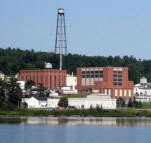by
Brendon Nafziger, DOTmed News Associate Editor | September 09, 2009

The NRU reactor at Chalk River--
shutdown through at least 2010
RESTON, Va. - SNM recently conducted a survey of nuclear pharmacies-pharmacies that supply the critical radioisotope Technetium-99m, which is used in more than 16 million nuclear medicine tests each year in the United States-to assess, anecdotally, the impact of the worldwide medical isotope shortage. According to the survey, 60 percent of radiopharmacies have been impacted by the most recent shortage. Technetium-99m is a product of Molybdenum-99, which has been in short supply recently.
Nuclear physicians and pharmacists are making changes to cope with the shortage, while striving to provide patients with the highest levels of care possible. For example, 75 percent of physicians are rescheduling patient tests by at least one day. In more than one out of three of these cases, tests have been delayed for longer than one month.
"This situation is untenable," said Robert W. Atcher, Ph.D., M.B.A, chair of SNM's Domestic Isotope Availability Task Force. "Nuclear scans and procedures that use Tc-99m are used to detect and diagnose many common cancers and cardiac conditions."




Ad Statistics
Times Displayed: 30210
Times Visited: 747 Stay up to date with the latest training to fix, troubleshoot, and maintain your critical care devices. GE HealthCare offers multiple training formats to empower teams and expand knowledge, saving you time and money
"In some cases, waiting even a day can severely impact care, especially if the condition is progressing rapidly," said Michael M. Graham, M.D., Ph.D., president of SNM. "Getting information early on in the disease progression is critical, and is one of the real benefits of molecular imaging."
In addition to delays, more than 80 percent of nuclear physicians and specialists are decreasing the dosage, which can lead to "longer exposure and less effective imaging scans," added Atcher.
Technetium-99m (Tc-99m) is a medical isotope derived from Mo-99 which is produced in reactors. Only six reactors in the world produce Mo-99 that is approved for use in the US. These reactors undergo routine maintenance. Recently, however, they have been experiencing chronic mechanical issues due to the age of the reactors and extended operation beyond their expected lifetime. When one reactor goes unexpectedly offline, this creates a limited supply of Mo-99, which is critically needed for nuclear medicine procedures. The most recent extended shortage began in May 2009, when the NRU reactor in Chalk River, Canada-the world's largest reactor that produces Mo-99-went off-line. The situation has been exacerbated by the recent announcement that the NRU reactor will remain off-line at least through 2010.
While the shortage began three months ago, radiopharmacists are increasingly feeling pressure to find alternative agents to offset the Mo-99 shortage. A recent outage of a second reactor for planned maintenance made the shortage worse.

